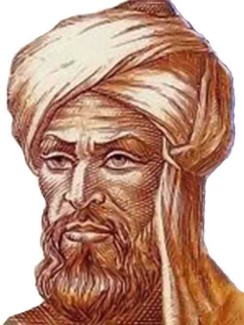
Muḥammad ibn Mūsā al-Khwārizmī, Arabized as al-Khwarizmi and formerly Latinized as Algorithmi, was a Persian polymath who produced vastly influential works in mathematics, astronomy, and geography. Around 820 CE he was appointed as the astronomer and head of the library of the House of Wisdom in Baghdad.
Al-Khwarizmi‘s popularizing treatise on algebra (The Compendious Book on Calculation by Completion and Balancing, c. 813–833) presented the first systematic solution of linear and quadratic equations. One of his principal achievements in algebra was his demonstration of how to solve quadratic equations by completing the square, for which he provided geometric justifications. Because he was the first to treat algebra as an independent discipline and introduced the methods of “reduction” and “balancing”, he has been described as the father or founder of algebra. The term algebra itself comes from the title of his book. His name gave rise to the terms algorism and algorithm.
Completing the Square
In modern notation, Al-Khwarizmi‘s process of completing the square is demonstrated by this example:
![]()
![]()
![]()


So a root is given by 

